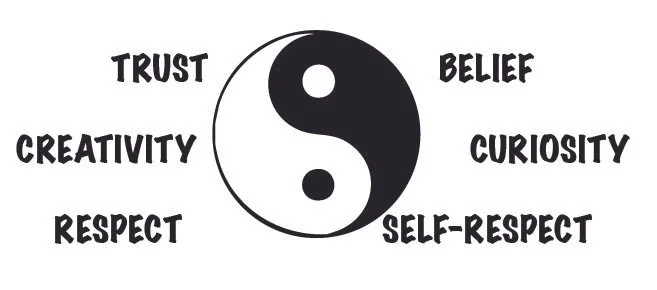What Confidence Looks and Feels Like
A team of interns and interns as learners
There is a lot happening in this photo, shared with me by a parent of the proud intern in the orange shirt. This is a photo of Grady and Linus leading a team of students learning about the basics of geometry, emergence, and bioengineering. This is what confidence looks and feels like.
Leadership, Confidence, and Being a Learner
It’s the other kids in this team is that worth noting. There are three other interns in this group. Some trained in biochemistry, structural engineering and simple machines, and logistics and statistics. It’s a fact of leadership that the best way to become an effective leader is to also learn what it’s like to be a follower.
All of these kids are competent and confident. All of them can teach, lead, and problem solve. They do this through the skills that being an intern and mentor provide, and from their hard-won confidence in themselves.
This is a fundamentasl lesson and skill I teach in my Leadership Academies at Mezzacello Urban Farm. As a mentor I have learned three very powerful lessons about being a mentor:
Mentorship is a contract of trust and belief
Mentorship is a two-way street
If a mentorship has not changed you, then something is wrong
If you are interested in learning more about the leadership academy series, please reach out to me using this link.
Mentorship is a contract of trust and belief
To be a great leader, you must believe both in yourself and in the people you lead. The moment your followers believe that you don’t trust them or believe in you - they will stop believing in you. The core lesson here is that leadership is not leveraging power, but building trust through empathy and action.
This fundamental component of being a leader is the most misunderstood facet of teaching kids to be leaders. Adults often do not believe that kids have the capacity to learn this. This photo is a direct refutation of that delusion. Each of these interns are leaders and they are trusted and valued team members. And they are all happy and confident with that fact.
At Mezzacello Urban Farm we maintain that trust and belief are two sides of the same coin. One cannot exist without the other. Like creativity and curiosity or respect and self-respect; It is a Yin and Yang relationship.
Mentorship Is a Two-Way Street
The key benefit of mentorship is the fact that to help others, one must know truths about themselves first. A mentor/intern or (mentern as I like to coll them) is trained to not only fully understand the subject matter they are teaching, but also their own personal strengths and weaknesses. This component of self-reflection is integral to the success of the Mentern and Leadership Program here at Mezzacello Urban Farm.
When a kid signs on to become a mentern they and their family agree that they have the capacity to do this. They understand that they will have to ask and answer questions about themselves and their topic. What they may not know immediately is that the very act of asking — and asnwering — those questions is going to help them grow.
The entire focus of this growth opportunity is its inherent sustainability and relevance. The menterns grow and their peer to peer nature enables others to grow as well. In a system where everyone has the opportunity to learn, grow, improve, and be a hero, what is the downside?
If a Mentorship Has Not Changed You, Then Something Is Wrong
The last element of the mentorship and leadership program is a direct result of the previous two; Understanding growth, change, and each other just a little but better. This last element is a metric that I can use to reliably model and show growth through programming. The mere fact that these menterns can do what I ask them to do is one thing, but that I can ask the kids learning with them to reflect on their growth as well? That is a bonus!
At Mezzacello Urban Farm summer camps and workshops we always start with self-reflection. What do you know about these three integral parts of what we are about to learn? Then we run the program and get through the Design Cycle.
The stages of the design cycle
The design cycle is a well-articulated process for helping kids learn through play and curiosity, relevance and the desire to be a problem-solver. It also conveniently ends in a presentation of learning. These skills are modeled by the menterns and the presentation serves as a dynamic and relevant post-assessment of learning.
We prefer building all presentations into the digital world that these kids inhabit naturally. They will learn and build their ideas and prototypes using the applied STEM learning and hands on tools available to create a solution. Then these kids and their menterns will build a video where they share their new skills.
This is how we know these programs change kids. I cannot count the number of times that kids have come to programs CONVINCED that speaking in public was NOT in their wheelhouse, only to find that I could not stop them from wanting to share their learning, even if I wanted to.
I love that my programs foster this kind of growth and sustainable partnerships. I am proud that my menterns are such effective teachers and leaders. I love that I am having to build out my leadership academy because so many kids who have attended my camps and workshops want to become menterns as well.
What will I do? Stay tuned, plans are afoot. Meanwhile, consider signing up for our early worm waiting list for programming in 2024 and 2025.




